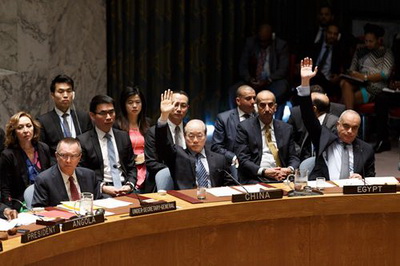
People’s Republic of China


At 10:00 a.m. of March 2, 2016 US Eastern Standard Time, the United Nations (UN) Security Council held a meeting and passed unanimously with 15 votes in favor the UN Security Council Resolution 2270 (UNSCR 2270) on the Democratic People’s Republic of Korea (DPRK). The resolution condemns the DPRK’s recent nuclear test and launching of satellite with ballistic missile technology and demands the DPRK to abort its nuclear and missile programs. The resolution has a definite target and plans further sanction measures against the DPRK’s nuclear and missile programs. Meanwhile, the resolution expresses concerns about the severe difficulties faced by people of the DPRK and points out that the resolution itself bears no intention to cause any negative impact on the humanitarian situation in the DPRK and economic cooperation activities with the DPRK. The resolution reaffirms its aim to maintain peace and stability of the Korean Peninsula and the Northeast Asia region, asks relevant parties to refrain from act that could aggravate tension and restates its support for resumption of the Six-Party Talks and commitments of achieving denuclearization of the Korean Peninsula in a peaceful way, the US and the DPRK’s promises of respecting each other's sovereignty and peaceful coexistence and promoting economic cooperation as set out in the September 19 Joint Statement of the Six-Party Talks.

Permanent Representative of China to the UN Liu Jieyi expressed to the media after the meeting that China opposes the DPRK’s nuclear test and launching of satellite with ballistic missile technology in violation of relevant UN Security Council resolutions. China adheres to achieving denuclearization of the Korean Peninsula, to safeguarding peace and stability on the Korean Peninsula and to solving the issue through dialogue and consultation. The Resolution 2270 passed by the UN Security Council embodies the above principle of “three adherences” and reflects China’s position and proposition regarding the Korean Peninsula nuclear issue, hence China voted in favor of the resolution.
Liu Jieyi said that this is a resolution with definite target. To achieve denuclearization of the Korean Peninsula as soon as possible is in the common interests of all parties concerned. Possession of nuclear weapons is not in line with the DPRK’s own interests. The Resolution 2270 is well targeted in its purpose and relevant sanction measures, which is strictly pinpointed to preventing the DPRK from advancing its activities on weapons of mass destruction such as nuclear missiles. The resolution clearly opposes the DPRK to further developing its nuclear missile capability and aims to prevent that from happening. It shows the solemn attitude of the international community toward safeguarding the nuclear non-proliferation regime and its commitment to realizing the goal of denuclearization of the Korean Peninsula.
This is a resolution that calls for all parties to ease tension. The resolution explicitly requires all parties to avoid taking any action that may escalate tension. Relevant parties should earnestly fulfill stipulations of the resolution and implement them as rapidly as possible. At present, all parties should especially keep calm, exercise restraint and refrain from taking any radical move. Actions on the grounds of the DPRK’s nuclear tests and satellite launch facilitated by ballistic missile technology, such as strengthening military confrontations and military maneuvers or deploying weapon system beyond defense needs of the Peninsula, are not helpful but harmful. These actions will escalate the tense situation on the Peninsula and make it more difficult to tackle the issue. When speaking at the UN Security Council, China underlined that it is a close neighbor of the Korean Peninsula and a country that has great responsibilities for the Peninsula stability. China always objects to war or instability on the Korean Peninsula and protects legitimate security interests of itself and other countries in the region. China opposes deployment of the THAAD missile defense system on the Peninsula because it damages strategic security interests of China and other countries in the region, violates the aim of safeguarding peace, security and stability of the Peninsula and will severely undermine efforts made by the international community to seek for political solutions to the Korean Peninsula issue.
This is a resolution that can advance peaceful dialogues. Sanction is never the final purpose. Nor can the UN Security Council resolutions settle the nuclear issue on the Korean Peninsula from the root. The Resolution 2270 reiterates the commitment to settle the Korean Peninsula nuclear issue and support the resumption of the Six-Party Talks and the September 19 Joint Statement. It should be a new starting point and “paving stone” of political settlement of the Korean Peninsula nuclear issue. In the next step the parties concerned should take opportunity of adoption of this resolution to launch dialogues and negotiations. The Chinese side has proposed the approach of advancing negotiations on denuclearization and talks on transforming from armistice regime to state of peace on the Peninsula in parallel. This approach is feasible, for it adheres to denuclearization on the Korean Peninsula and settles in a balanced way concerns of all parties. All relevant parties should meet China half way, explore together the concrete steps to promote the above-mentioned idea, proceed from the big picture of safeguarding peace and stability of the Korean Peninsula and the Northeast Asia region and make joint efforts to realize denuclearization on the Peninsula.
This is a resolution that takes full consideration of the humanitarian situation and people’s livelihood in the DPRK. Showing deep concerns towards serious difficulties facing the DPRK people, it points out that measures in the resolution are neither intended to bring unfavorable results to the DPRK in terms of its humanitarian situation nor to exercise negative influences on economic activities and cooperation that are not prohibited by the UN Security Council resolutions as well as humanitarian assistance carried out in the country. The resolution also reiterates the commitment of the Six-Party Talks to promote economic cooperation.
Members of the UN Security Council also stated their respective stances on the meeting of that day.


